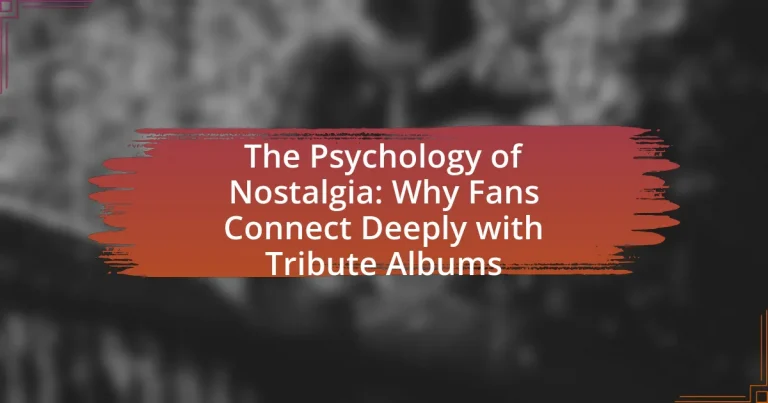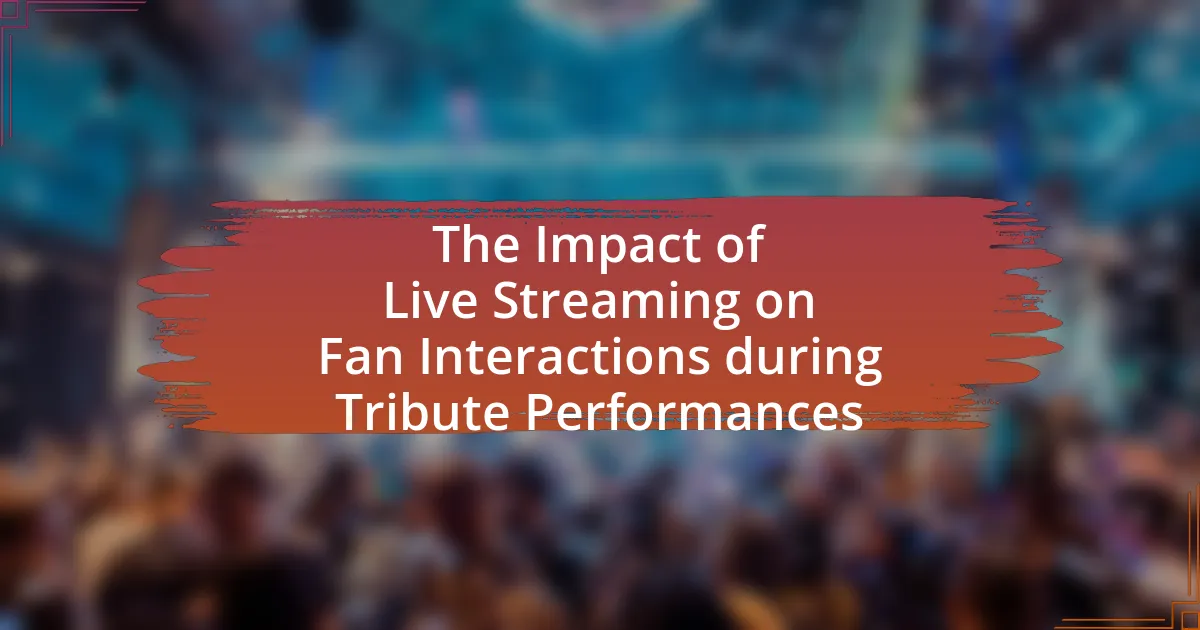The article explores the psychology of nostalgia and its profound impact on fans’ connections to tribute albums. It defines nostalgia as an emotional experience characterized by longing for the past, which enhances mood, social connectedness, and personal identity. The article discusses how nostalgia influences human emotions, memory recall, and the psychological mechanisms behind these feelings. It also examines the significance of tribute albums in preserving musical legacies, evoking memories, and fostering community among fans, while highlighting the emotional responses and psychological benefits derived from engaging with these albums.
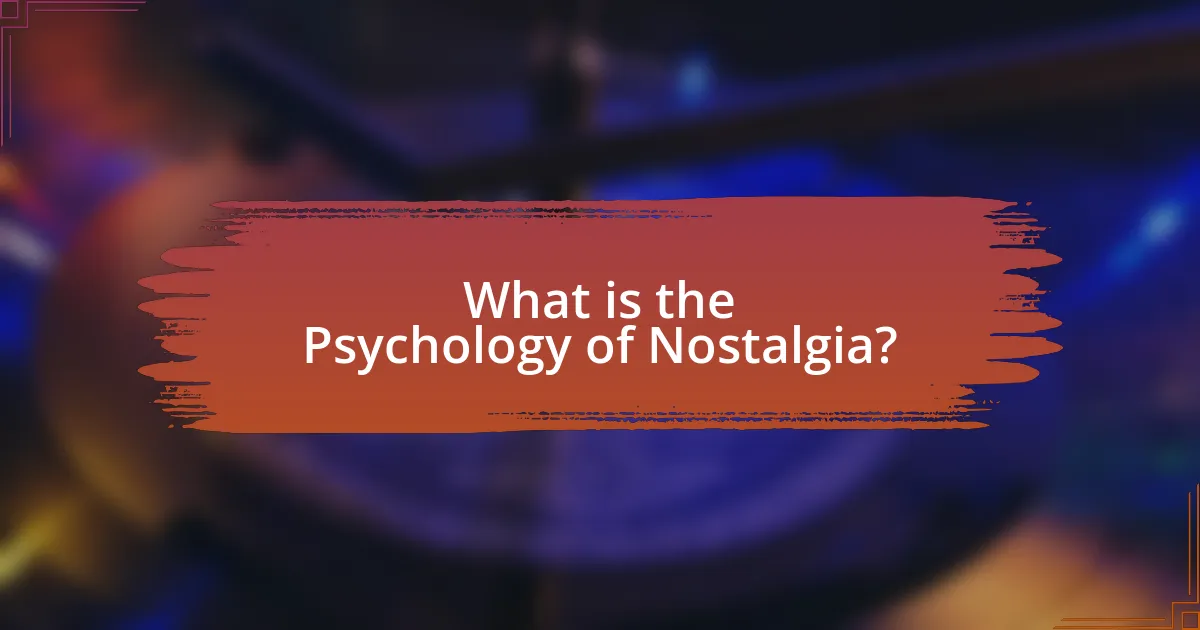
What is the Psychology of Nostalgia?
The psychology of nostalgia refers to the emotional experience of longing for the past, often characterized by feelings of warmth, happiness, and a sense of belonging. This phenomenon is rooted in memory and can evoke positive emotions associated with significant life events, relationships, or cultural moments. Research indicates that nostalgia can enhance mood, increase social connectedness, and provide a sense of continuity in one’s identity. For instance, a study published in the journal “Emotion” by Wildschut et al. (2006) found that nostalgia can counteract feelings of loneliness and enhance self-esteem, demonstrating its psychological benefits.
How does nostalgia influence human emotions?
Nostalgia significantly influences human emotions by evoking feelings of warmth, happiness, and a sense of belonging. This emotional response occurs because nostalgia activates brain regions associated with reward and pleasure, such as the ventral striatum. Research indicates that nostalgic memories can enhance mood and increase self-esteem, providing comfort during times of stress or loneliness. A study published in the journal Emotion found that participants who engaged in nostalgic recollection reported higher levels of positive emotions and lower levels of negative emotions, demonstrating nostalgia’s powerful role in emotional regulation.
What are the psychological mechanisms behind nostalgia?
Nostalgia is primarily driven by psychological mechanisms such as memory recall, emotional regulation, and social connectedness. Memory recall allows individuals to access past experiences, often idealized, which can evoke positive emotions. Emotional regulation is facilitated through nostalgia, as it helps individuals cope with current stressors by providing comfort and a sense of continuity. Additionally, nostalgia fosters social connectedness by reinforcing bonds with others who share similar memories, enhancing feelings of belonging. Research by Batcho (1995) indicates that nostalgia can serve as a coping mechanism, promoting psychological well-being by counteracting feelings of loneliness and anxiety.
How does nostalgia affect memory recall?
Nostalgia enhances memory recall by activating emotional connections to past experiences, which can lead to more vivid and detailed recollections. Research indicates that nostalgic memories often evoke strong emotions, making them easier to retrieve. For instance, a study published in the journal “Memory” by Wildschut et al. (2006) found that nostalgia can improve memory recall by increasing the accessibility of specific autobiographical memories, thereby enriching the overall memory experience. This emotional engagement associated with nostalgia not only aids in recalling personal memories but also fosters a sense of continuity and identity, further solidifying the impact of nostalgia on memory recall.
Why do people experience nostalgia?
People experience nostalgia as a psychological response that evokes feelings of longing for the past, often triggered by specific memories, objects, or experiences. This emotional state serves several functions, including enhancing mood, fostering social connections, and providing a sense of continuity in life. Research indicates that nostalgia can increase feelings of social connectedness and improve overall well-being; for instance, a study published in the journal “Emotion” by Wildschut et al. (2006) found that nostalgic memories can counteract loneliness and promote a sense of belonging.
What triggers nostalgic feelings in individuals?
Nostalgic feelings in individuals are primarily triggered by sensory stimuli such as music, scents, and visual cues that evoke memories of past experiences. Research indicates that music, particularly songs associated with significant life events, can elicit strong emotional responses and memories, leading to nostalgia. For example, a study published in the journal “Emotion” by Janata et al. (2007) found that familiar music can activate brain regions associated with memory retrieval, reinforcing the connection between music and nostalgic feelings. Additionally, personal milestones, cultural artifacts, and social interactions also play a crucial role in triggering nostalgia, as they remind individuals of their past identities and experiences.
How does nostalgia relate to personal identity?
Nostalgia significantly influences personal identity by serving as a bridge between past experiences and present self-perception. This emotional connection to past events, people, and places helps individuals construct a coherent narrative of their lives, reinforcing their sense of self. Research indicates that nostalgia can enhance self-continuity, as it allows individuals to reflect on their personal history and maintain a sense of belonging. For instance, a study published in the journal “Emotion” by Wildschut et al. (2006) found that nostalgic memories often evoke feelings of warmth and connection, which can strengthen one’s identity by linking past experiences to current values and beliefs.
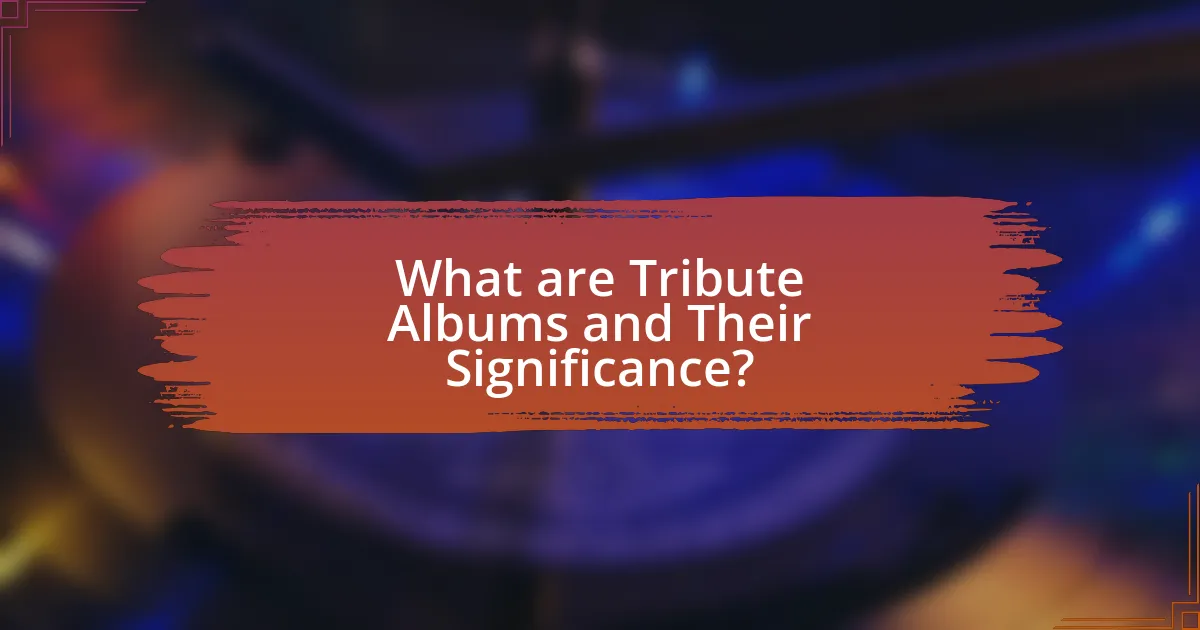
What are Tribute Albums and Their Significance?
Tribute albums are collections of songs that pay homage to a specific artist, band, or musical genre, often featuring various artists covering the original works. Their significance lies in their ability to evoke nostalgia, allowing fans to reconnect with the music and memories associated with the original artist, while also introducing the music to new audiences. For instance, the tribute album “The Art of McCartney,” which features various artists covering Paul McCartney’s songs, illustrates how these albums can celebrate an artist’s legacy and influence. This connection to nostalgia enhances emotional engagement, as fans often associate the music with personal experiences, thereby deepening their appreciation for both the tribute and the original works.
How do tribute albums connect to nostalgia?
Tribute albums connect to nostalgia by evoking memories associated with the original artists and their music, often reminding listeners of significant moments in their lives. These albums serve as a means for fans to reconnect with the emotional experiences tied to the original songs, reinforcing their attachment to the music and the artists. Research indicates that nostalgia can enhance feelings of social connectedness and personal identity, which is particularly relevant when fans engage with tribute albums that celebrate beloved musicians. For instance, a study published in the journal “Emotion” found that nostalgic music can trigger vivid memories and emotions, further solidifying the bond between fans and the music they cherish.
What role do tribute albums play in preserving musical legacies?
Tribute albums play a crucial role in preserving musical legacies by honoring and revitalizing the works of influential artists. These albums serve as a means for contemporary musicians to reinterpret and celebrate the original artist’s contributions, ensuring that their music remains relevant and accessible to new generations. For instance, the tribute album “We Are the World” not only raised funds for humanitarian efforts but also immortalized the collaborative spirit of the artists involved, reinforcing the cultural impact of the original song. By capturing the essence of the original works through diverse interpretations, tribute albums help maintain the emotional connection fans have with the music and the artists, thereby solidifying their legacies in the music industry.
How do tribute albums evoke memories for fans?
Tribute albums evoke memories for fans by reinterpreting beloved songs, which often triggers nostalgia associated with personal experiences linked to the original music. This phenomenon occurs because music is closely tied to emotional memories; research indicates that familiar melodies can activate brain regions associated with memory recall. For instance, a study published in the journal “Psychology of Music” found that nostalgic music can elicit vivid recollections of past events, enhancing emotional connections. Therefore, tribute albums serve as a vehicle for fans to relive significant moments, reinforcing their attachment to the original artists and the memories associated with their music.
Why do fans gravitate towards tribute albums?
Fans gravitate towards tribute albums because they evoke nostalgia and emotional connections to beloved artists and their music. Tribute albums often feature reinterpretations of classic songs, allowing fans to relive cherished memories associated with those tracks. Research indicates that nostalgia can enhance mood and foster a sense of belonging, making tribute albums particularly appealing. For instance, a study published in the Journal of Personality and Social Psychology found that nostalgic experiences can increase feelings of social connectedness and self-esteem, which fans may seek through these albums.
What emotional responses do tribute albums elicit?
Tribute albums elicit a range of emotional responses, primarily nostalgia, appreciation, and sometimes grief. Nostalgia arises as fans recall memories associated with the original artists or songs, often leading to a sense of connection to the past. Appreciation is felt for the reinterpretation of beloved tracks, allowing listeners to experience familiar music in a new light. Grief may surface, particularly when the tribute is dedicated to a deceased artist, as fans reflect on loss and the impact of that artist’s work on their lives. Research indicates that music can evoke strong emotional reactions, with nostalgia being a significant factor in how individuals relate to music and its associated memories.
How do tribute albums foster community among fans?
Tribute albums foster community among fans by creating a shared experience that celebrates a beloved artist or genre. These albums often feature various artists covering songs, which allows fans to connect over their mutual appreciation for the original music and the emotions it evokes. This collective engagement is reinforced by events such as listening parties or tribute concerts, where fans gather to enjoy the music together, further solidifying their sense of belonging. Research indicates that shared musical experiences can enhance social bonds, as seen in studies showing that music can serve as a social glue, bringing individuals together through common interests and nostalgia.
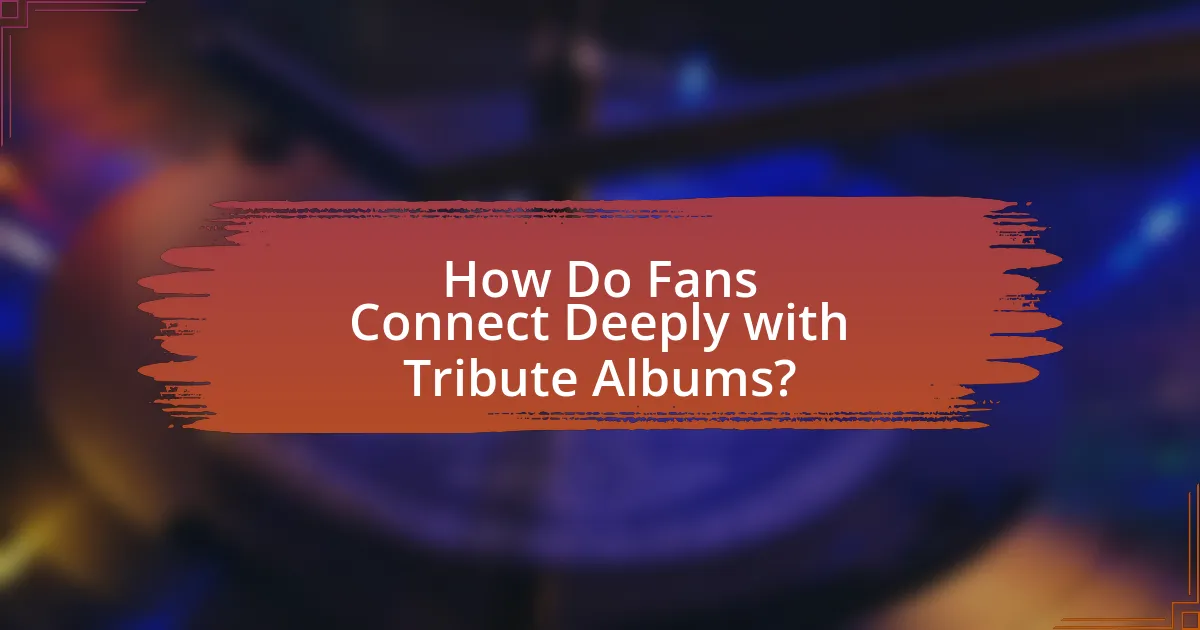
How Do Fans Connect Deeply with Tribute Albums?
Fans connect deeply with tribute albums through emotional resonance and nostalgia, as these albums often evoke memories associated with the original artists and their music. The familiarity of the songs, combined with the reinterpretation by new artists, allows fans to relive significant moments in their lives, reinforcing their emotional attachment. Research indicates that nostalgia can enhance feelings of social connectedness and personal identity, making tribute albums a powerful medium for fans to engage with their past experiences and the cultural significance of the original music.
What psychological benefits do fans gain from tribute albums?
Fans gain several psychological benefits from tribute albums, primarily including nostalgia, emotional connection, and community bonding. Nostalgia arises as tribute albums often evoke memories associated with the original artists, allowing fans to relive significant moments from their past. This emotional connection can enhance feelings of happiness and comfort, as studies show that nostalgia can improve mood and increase feelings of social connectedness. Additionally, tribute albums foster a sense of community among fans, as they often share a collective appreciation for the original artist and the tribute work, leading to social interactions and shared experiences that can enhance overall well-being.
How do tribute albums provide comfort and solace?
Tribute albums provide comfort and solace by allowing listeners to reconnect with the emotional resonance of the original artist’s music, often evoking nostalgia and shared memories. This connection can facilitate healing during times of loss, as fans experience a sense of continuity and community through the reinterpretation of beloved songs. Research indicates that nostalgia can enhance mood and foster social connectedness, which is particularly relevant when fans engage with tribute albums that honor artists who have passed away. For instance, a study published in the Journal of Personality and Social Psychology found that nostalgia can increase feelings of belonging and reduce feelings of loneliness, reinforcing the idea that tribute albums serve as a therapeutic outlet for fans seeking solace in their grief.
What impact do tribute albums have on fans’ sense of belonging?
Tribute albums significantly enhance fans’ sense of belonging by fostering a shared emotional connection to the original artists and their music. These albums often evoke nostalgia, allowing fans to reminisce about personal experiences associated with the original songs, which strengthens their emotional ties to both the music and the community of fellow fans. Research indicates that nostalgia can increase feelings of social connectedness, as seen in a study published in the Journal of Personality and Social Psychology, where participants reported feeling more connected to others when reflecting on nostalgic memories. This collective experience of engaging with tribute albums creates a communal bond among fans, reinforcing their identity within a larger group that shares similar musical tastes and emotional experiences.
What factors enhance the emotional connection to tribute albums?
The emotional connection to tribute albums is enhanced by nostalgia, personal memories, and the shared experience of loss. Nostalgia evokes feelings tied to past experiences, often linked to specific songs or artists, which can trigger strong emotional responses. Personal memories associated with the music, such as significant life events or relationships, deepen this connection. Additionally, tribute albums often serve as a communal expression of grief and celebration, allowing fans to collectively honor the legacy of the artist, further solidifying their emotional ties. Research indicates that nostalgia can increase feelings of social connectedness and well-being, reinforcing the bond fans feel towards tribute albums.
How does the choice of artists in tribute albums affect fan engagement?
The choice of artists in tribute albums significantly affects fan engagement by influencing emotional connections and nostalgia. When familiar or beloved artists cover songs, fans often experience heightened emotional responses, as these artists evoke memories associated with the original music. Research indicates that nostalgia can enhance emotional engagement, leading to increased sharing and discussion among fans. For instance, a study published in the Journal of Consumer Research found that nostalgia-driven marketing, including music, can boost consumer engagement by 20%. Therefore, selecting artists who resonate with the target audience can amplify fan interaction and deepen their connection to the tribute album.
What role does nostalgia play in the success of tribute albums?
Nostalgia significantly contributes to the success of tribute albums by evoking emotional connections to past experiences and memories associated with the original artists. This emotional resonance encourages listeners to engage with the music, as nostalgia can enhance feelings of happiness and comfort, making the tribute albums appealing. Research indicates that nostalgia can increase consumer preferences and willingness to purchase products, including music, as it taps into a longing for the past (Routledge et al., 2011, “Nostalgia: A Psychological Resource”). Thus, the nostalgic element not only drives sales but also fosters a deeper connection between fans and the music, reinforcing the tribute album’s success.
What are some best practices for creating impactful tribute albums?
To create impactful tribute albums, it is essential to focus on authenticity, emotional connection, and high-quality production. Authenticity ensures that the tribute reflects the original artist’s style and essence, which resonates with fans. Emotional connection can be achieved by selecting songs that evoke nostalgia and personal memories, as studies show that nostalgia enhances emotional responses and strengthens connections to music. High-quality production is crucial; professional sound engineering and arrangement elevate the listening experience, making it more enjoyable and memorable. For instance, tribute albums like “The Tribute to Johnny Cash” have successfully combined these elements, leading to critical acclaim and strong fan engagement.
How can artists effectively capture the essence of the original work?
Artists can effectively capture the essence of the original work by deeply understanding its emotional and thematic core. This involves analyzing the original piece’s stylistic elements, lyrical content, and cultural context to recreate its impact. For instance, tribute albums often succeed by maintaining the original artist’s signature sound while infusing personal interpretations that resonate with both new and existing audiences. Research indicates that nostalgia plays a significant role in this process, as it evokes emotional connections that enhance the listener’s experience, making them feel a sense of familiarity and comfort. By leveraging these emotional triggers, artists can create works that honor the original while establishing their unique voice.
What strategies can be used to engage fans during the tribute album process?
To engage fans during the tribute album process, artists can utilize strategies such as interactive social media campaigns, exclusive behind-the-scenes content, and fan voting on song selections. Interactive social media campaigns allow fans to share their memories and experiences related to the original artist, fostering a sense of community and nostalgia. Exclusive behind-the-scenes content, such as videos or interviews with artists involved in the tribute, can deepen fans’ emotional connection to the project. Additionally, fan voting on song selections empowers fans and makes them feel invested in the tribute album, enhancing their overall engagement. These strategies leverage the psychological aspects of nostalgia, as fans often seek to relive cherished memories associated with the original music.
